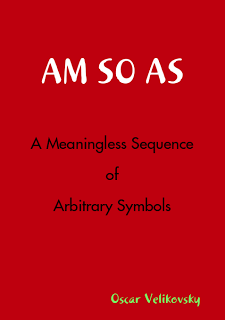Interview with JoeTV in "Writer" Magazine
INTERVIEW in Jan 2012 Issue of "Writer" Magazine.
Writer at Work: Joe T Velikovsky
Transmedia Writer Joe Velikovsky is often writing a feature film script,a game, a novel, and a graphic novel all at once.
Among his achievements are The Feature Screenwriters Workbook (available free online: http://www.lulu.com/product/ebook/feature-screenwriters-workbook/15459299), the comic strip Dr N Sayne (illustrated by Deane Taylor), the feature filmCaught Inside (http://www.youtube.com/joeteevee) and the satirical transmedia novel A Meaningless Sequenceof Arbitrary Symbols. (http://am-so-as.webs.com/)
He works as a Transmedia Consultant and as a ScriptAssessor for the Writers' Guild. His website is www.joeteevee.com and he writes a blog at http://on-writering.blogspot.com/ .
Tell me about your involvement in the National Young Writers' Festival.
Smack-bang out-of-the-blue, Ireceived an email asking me to appear on two panels at the Festival this year:'Games Writing' and 'Transmedia: The Business Behind the Buzzword'. I wasthrilled to accept. It was exciting timing for me because I'd recently finishedwriting a big videogame and a comic, and the feature film Caught Inside, for which I was the screenwriter, opened in cinemas theweek after the Festival.
The Festival is brilliant forWriters of all ages - and it was nice to get back to Newcastle NSW, where Ilived for five years when I was studying for a BA in Communications(Screenwriting major) at the University of Newcastle. I'm deeply fond ofNovocastria: it was there that I started my professional writing career,working in comedy theatre with Footlice Theatre Co, as a TV sketch-comedywriter and making films at uni.
How involved is the task of game writing? How did you land that gig?
Game writing is truly, madly,deeply involved! It's not just a case of 'making up a story to fit the game',though that's certainly part of it. As a writer, you need to consult regularlywith the game designer and the game level designers, producers and artists,programmers and sound guys, to make sure that the game story and the dialogueall still 'works'. Half of what you're doing changes every day as the gameevolves while it's being made over two or three years. The writing andrewriting during the game production process can be ultra-intense. I think it'sactually about three times as much writing as on a feature film (even when a filmscript goes through several drafts).
It's also a totally different wayof thinking about narrative. Feature films and novels are (generally speaking)linear narratives, but with non-linear stories you need to design the manyparts of the story (and lines of dialogue) to work effectively even if they areexperienced in different combinations and orders.
The Looney Tunes: Acme Arsenal game I wrote had only 1,060 lines ofdialog (in an Excel spreadsheet), but there's much more writing involved thansimply the dialogue: there were outlines, character design briefs and 70-pageillustrated treatments for each of the ten levels ('chapters') in the game.
I landed my first gig writinggames the day I finished the Game Writing and Design short course at the AustralianFilm Television and Radio School. Someone rang the school that day looking fora game writer and my name was put forward. In truth, I'd been making my owncomputer games since I was seven years old. What an über-nerd.
What's the biggest challenge you have faced as a Transmedia Writer?Your most memorable moment?
It was challenging working on agame project where we were adapting a movie I thought wasn't very good. It washard to take the game and its story seriously when the film story isn't brilliant.Another challenge is when several producers all want to pull the project in adifferent direction. That can drive you nuts, but when collaboration reallyworks (with a great blend of creatives all working in sync), it's the greatestrush.
My most memorable Transmedia momentwas when I was working on a project with Robert Watts, the producer of thefirst three Star Wars and Indiana Jones movies. I wrote ascreenplay that Robert had optioned and, while we were working on the film, thegame and a comic all at once, in the middle of it all we met with George Lucas,who was one of the reasons I wanted to be a writer-director-producer in thefirst place. Robert put on 2001: A SpaceOdyssey and was telling us about working with Kubrick (one of my other filmheroes).
Then, to cap it off, Robertcompletely blew all our minds by telling us his idea for a new form ofnon-linear cinema storytelling: the audience watches a 10-minute introductoryfilm about five main characters, the movie stops and the lights come up, andthen the film branches off into five different films in five different cinemas,each film within the one over-arching story.
Having seen one film, there arefour other films you have to see to get the whole story, and of course thereare multiple twists, so that characters that you assumed were 'good guys' basedon one point of view actually turn out to be villains once you've seen whatthey were up when they were 'offscreen' in the other story streams. It's abrilliant way to tell a story and is exactly what transmedia storytelling is,except that with conventional transmedia the idea is split across three or moredifferent media formats (a film, a game, a comic).
I also loved working with MarvWolfman, the creator of Blade. He publishedStephen King's first short story and was THE guy who first got comic writers acredit, back in the 1950s: he signed 'by the Wolf Man' under the title of ahorror comic story and suddenly every other comic writer insisted on a writer'scredit. He taught me so much about storytelling.
What are your tips for writers who want to be published?
If you want to be a publishednovelist, I recommend you read Elizabeth Paton's thesis Creativity and the Dynamic System of Australian Fiction Writing,which is available free online and include interviews with 40 Australianpublished fiction writers. It's available as a free .pdf online through theuniversity of Canberra library:
http://erl.canberra.edu.au/public/adt-AUC20090825.125448/index.html
The thesis even delves into 'Whatis Creativity, and How Do I Do It?', which is something that a lot of writersdon't study enough, in my opinion.
My other big tip is: submit,submit, submit, and just work through the rejections! Use any advice you getfrom publishers, but know which advice to ignore as well, if someone simplydoesn't 'get' your work. For writers who feel they're merely 'running on therejection treadmill', I highly recommend the book Rotten Rejections: The Letters Publishers Wish They'd Never Sent, whichis a hilarious and very encouraging collection of rejection letters. Allsuccessful writers were rejected once. Some, like Robert M Pirsig (Zen &The Art of Motorcycle Maintenance), 122 times!
Is there a large community of Transmedia Writers in Australia?
Funnily enough, no, I don't believethere is a large community. Or if there is, we should all join forces and fightcrime together.
Did you plan to build up such diverse experience in media?
No way! I started my Bachelor Degreetrying to get into advertising as a copywriter (as all my favourite authors,like Joseph Heller, Don deLillo and Flann O'Brien, seemed to work in advertisingbefore they cracked novel-writing)! Then I did Horror Film Studies at uni and Imade a bunch of films, and I was hooked.
I can't resist telling stories across as many media aspossible and I have always been that way. They do always say "you should writewhat you know" and so, with the satirical novel A Meaningless Sequence of Arbitrary Symbols, I found myself writinga transmedia story about a transmedia writer, using transmedia to tell thestory (films, games, novels, cult manifesto.) The title is a send-up of Dan Brown's "The Da Vinci Code." And the story itself satirizes Salinger's "The Catcher In The Rye" and Fitzgerald's "The Great Gatsby." If you haven't read all three, you may not get all the literary references, but the story is stand-alone, either way. It's really all about Transmedia, and how Videogames are actually made. After 20 years of writing and designing games, movies, comics, I figured I could do an expose.
A Meaningless Sequenceof Arbitrary Symbols Blog: http://am-so-as.blogspot.com/

A Meaningless Sequenceof Arbitrary Symbols e-novellette on Kindle: http://www.amazon.com/gp/product/B004XW2GDK/
Do you have a favourite medium?
Yes! Feature films, without adoubt, have always been my 'first love'. Though I do love the freedom of novelsbecause the budget of any given genre, scene or story is irrelevant. Imagination is the only limiting factor in novels.
Games are loads of fun to write -but the downside is that they're simply not as narratively satisfying for awriter. I think the main reason for this is that, as Henry Jenkins says, 'Playerfreedom annihilates Character'. It's the old 'agency versus structure' (freedomversus constraints) issue. Besides which, games are also usually so damnedexpensive to make! In my experience, the more expensive the art form or medium,the less interesting it becomes; the product always becomes 'safer' as thebudgets go further north. That's why self-publishing is so interesting – and empowering.
Do you think your experiences as a Game Design/Writing Mentorfor the Australia Council and as a Script Assessor for the AWG havecontributed to your ongoing development as a writer?
Absolutely, yes - mainly asmentoring is teaching, and ironically, you always learn the most by teachingsomething... When you're passing on skills and techniques that have `workedbefore' - you're also constantly comparing those techniques to other possibleapproaches (for example, different ways to structure/`reveal to the player' agame story), and - mentoring also sometimes involves additional research (say,into game development tools for a certain game platform - e.g. iPhones orAndroid phones - etc) that you may not have otherwise explored...
Also working as a Story Analyst/ScriptAssessor (not just for the Guild, but for film studios as well) is fantasticexperience for any writer - having to read and think critically about allaspects of hundreds of scripts makes you consider all those same issues in yourown work - it's just invaluable. The Guild is actually running trainingsessions at the moment, for aspiring script assessors (see the AWG website). Ithink the Writer's Guild does a simply amazing job in advancing the art and craft ofwriting. Hats off to those guys!

www.joeteevee.com
Published on January 06, 2012 23:19
No comments have been added yet.



